With a handful of Conservative-supporting billionaires controlling most of the country’s national newspaper industry, the BBC in the firing line of the Tory right, the arrival of two openly reactionary broadcasters, and the launch of more right-wing populist news websites, Britain’s media is shifting further to the right.

Data from the Reuters Institute for the Study of Journalism in 2022 showed that consumer trust in UK media was in rapid decline. The Times, the Telegraph and the BBC had suffered the biggest drops in trust among news media over the past five years.
Research by Reuters also shows that people still value the ideal of impartial news, particularly in countries like the UK, where debates about politics and social justice have become deeply polarised.
With the rise opinion-led television formats, and traditional print publications focusing more on opinion pieces as a means of driving traffic and standing out online, the news impartiality consumers crave is diminishing.
And with a handful of Conservative-supporting billionaires controlling most of the country’s national newspaper industry, the BBC in the firing line of the Tory right, the arrival of two openly reactionary broadcasters, and the launch of more right-wing populist news websites by the likes of Kelvin MacKenzie, former editor of the Sun, Britain’s media is shifting further to the right.
Four ultra-rich men – Fourth Viscount Rothermere, Jonathan Harmsworth, Rupert Murdoch, the surviving Barclay brother, and Evgeny Lebedev – control three-quarters of Britain’s national newspapers.
In September 2022, Harmsworth won his bid to take full control of the Daily Mail publisher, DMGT. The estimated £2.4bn takeover deal, meant the Rothermere family, which already owned around 34 percent of DMGT shares, paid close to £1.6bn for the part of the company that they did not already own.
As well as the Mail titles, the media multinational owns the Metro and i. It had been listed on the London Stock Exchange since 1932 but was delisted following the successful bid offer by Rothermere, thereby removing the family business from the glare of public markets. In other words, now being private without outside shareholders, Rothermere can do what he wants.
DMGT was founded by Rothermere’s great-grandfather. The family has a long history of supporting right-wing political parties, including the fascists in the 1930s. In January 1934, the newspaper published what became one of its most famous articles. Entitled ‘Hurrah for the Blackshirts’, the article celebrated Oswald Mosley and the British Union of Fascists (BUF). The piece was penned by Lord Rothermere. In it, he praised Mosley and the Blackshirts, seeing them as the correct party to “take over responsibility for [British] national affairs.”
The Mail’s long history of campaigning against the interests of the working people remains at play today. One example of this is how the paper’s current owner, Jonathan Harmsworth, has the tax-avoiding ‘non-dom’ status. In 2015, the newspaper ran a smear campaign against Ed Miliband, in a bid to destroy his chances of becoming PM. Miliband had promised to remove non-domicile tax status. Little surprise there then.
In 2020, the Daily Mail surpassed Murdoch’s Sun as the top-selling newspaper in the UK, albeit because the latter’s circulation fell faster than the Mail’s. The Sun had maintained the title since 1978.
The ousting of Geordie Greig
Despite turning the Mail into Britain’s best-selling title, in 2021, the paper’s then editor Geordie Greig was ousted after just three years in the job. Pro-Remain Greig notoriously clashed with his predecessor Paul Dacre. Under Dacre’s 25-year reign as editor, the Mail was described as the UK’s most fanatical anti-liberal voice. It was even suggested that Dacre could be the most dangerous man in Britain.
Under Greig’s brief lead, the newspaper even held the government to account. It probably caught the mood of the country over the Cumming’s lockdown-breaking scandal, and the Owen Paterson debacle, with one of Greig’s headlines reading: ‘SHAMELESS MPs SINK BACK INTO SLEAZE.’
When Greig abruptly left, Paul Dacre, who had pulled out of running to be the next chair of the media regulator, Ofcom, returned as editor-in-chief of the newspaper’s parent company. Ted Verity became the new head of a seven-day print operation. News of the defenestration of Greig was made to staff by Jonathan Harmsworth in an email.
Without Greig in charge, the Mail has slid back to the despotic voice it was under Paul Dacre. During the painful ‘who’s going to be Boris’ successor’ reporting last summer, the Mail unleashed weeks of pro-Truss stories, attacks on her rivals and puff-pieces, thundering that the ‘Tory right’ needed to unite or let ‘establishment favourite Rishi Sunak’ into No 10. Of course, its fanatical promotion of Truss has now been conveniently forgotten, given the disaster that unfolded during her brief tenure at the top.
Then there are the newspapers owned by probably the second most powerful person in British news media, after Viscount Rothermere – Rupert Murdoch.
Murdoch’s diversified empire
While the phone hacking and the Leveson Inquiry scandals might have led to the demise of Murdoch’s News of the World – one of the world’s best-selling English language newspapers – his UK media empire lives on. The media magnate has committed hundreds of millions of pounds trying to update News UK, whose titles include the Sun, the Sun on Sunday, the Times and the Sunday Times. His tabloid journalism has still struggled to retain readers though and Murdoch decided to return to British TV. But more on that shortly.
With his media empire diversifying and moving beyond print, Murdoch’s cosy relationship with the Tory government became more insidious than ever.
The Australian-born American media entrepreneur even admitted that he often entered Downing Street “by the back door.”
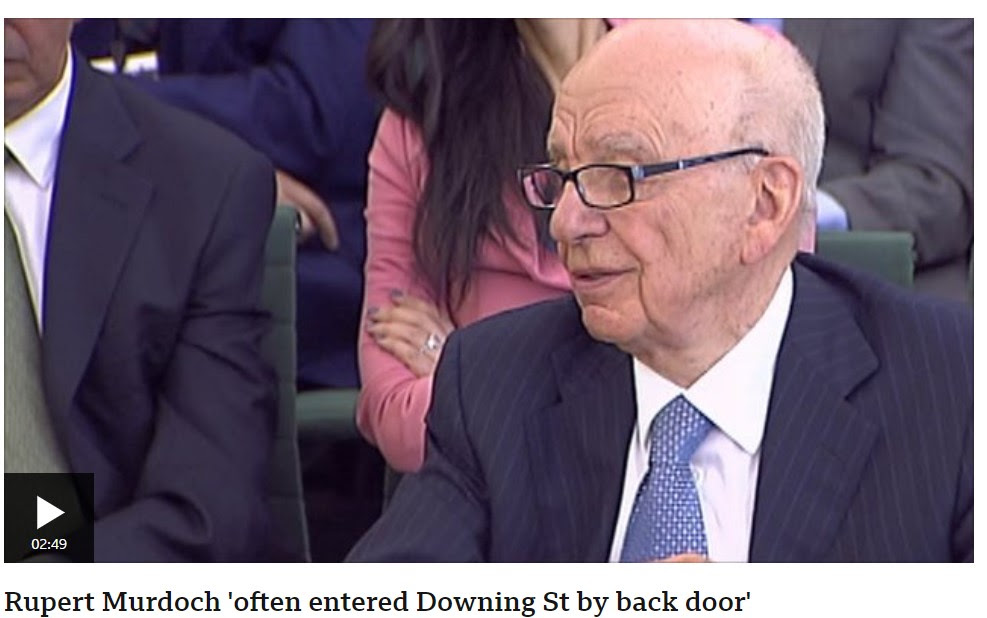
In 2020, research laid bare the remarkable levels of access Murdoch’s papers have to the Tory government. As LFF reported, a study by Hacked Off found that Murdoch personally met with the government three times in Johnson’s first six months in office. As well as his media influence, the billionaire has also used his cash as a political power, having donated £19,000 to the Tory Party in 2004.
Speaking of influential media barons being in bed with the government, the Barclay brothers, billionaire owners of the Daily Telegraph, Sunday Telegraph and the Spectator, long made their support for the Tories known. In 2004, the brothers insisted that the Daily Telegraph would maintain its traditional support for the Conservative Party under their ownership. The passing of Sir David Barclay in 2021, meant the titles are in the sole hands of Sir Frederick Barclay, who lives on Brecqhou, a private island in the Channel Islands. He may or may not have given up day to day running of the group but whatever the future, nobody expects the Telegraph to become a Labour paper any day soon, or even mildly liberal.
Then there is Evgeny Lebedev, the Russian-British businessman who owns Lebedev Holdings Ltd, which in-turn owns the Evening Standard and is the Independent’s largest shareholder. In 2020, Lebedev, who has a net worth of $300 million, was made a life peer after being nominated by Boris Johnson for his work in the media industry and support for conservation charities.
Between Rothermere, Murdoch, Barclay and Lebedev, the media barons control just under 75 percent of all national newspapers in the UK, according to 2020 figures.
Though of course when examining the UK media’s shot to the right, we must look well beyond print.
Print media has been dominated for over 100 years by the likes of the Mail, the Express, the Telegraph and the Times. The situation improved slightly by the development of radio and television and the launch of the BBC, and of course, more latterly, the rise of digital news.
Though sadly, digital native news brands have not yet managed to overhaul the long-engrained media legacy of the mainstream giants. Analysis by the Press Gazette shows that digital media is dominated by legacy titans.
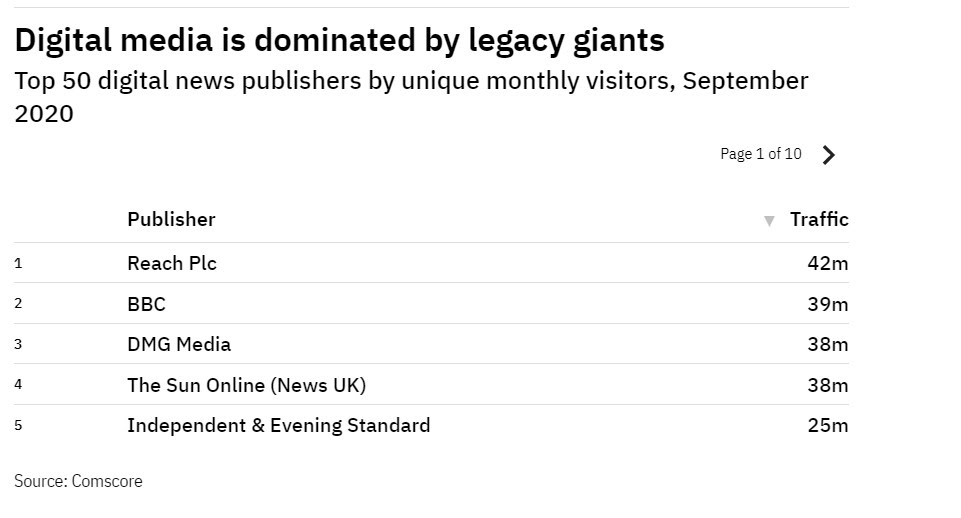
The ‘Foxification’ of UK media
In 2021, two new TV news channels arrived in Britain. talkTV – owned by Rupert Murdoch – and GB News, are seen as the British equivalents to the popular conservative US channel Fox News. Both talkTV and GB News emerged as ideas to counter established British news channels such as BBC and Sky.
Concerns about the ‘Foxification’ of the British media have been raised, namely that the arrival of two opinionated right-wing broadcasters is the last thing a deeply fractured and ill-informed country needs.
Unease that the Fox News-style channels would create more media bias and contribute to political polarisation came to light just last week with the announcement that Jacob Rees-Mogg and Nadine Dorries are to host their own talk shows on GB News and talkTV respectively.
Not only are right-wingers with vested political interests associated with owning and operating the channels, but they are even presenting their own shows, thereby talking to audiences directly. Granted, the audiences of the new channels might be small, but their arrival is further testimony of the UK media’s overall shift to the right.
BBC in the right-wing firing line
But perhaps the saddest part of the British media’s swing to the right, has been the fate of the BBC. The public corporation has long been in the firing line of the Tory right. Together with fellow national treasures the NHS and the National Trust, politicised campaigns have been waged against the BBC, designed to influence control and direction.
David Cameron gnawed away at it, making it accept a £750m cut or take responsibility to ending free licenses for the over-75s. Boris Johnson made an irate threat to abolish the licence fee, amid a row of the then PM’s refusal to look at a picture of a sick boy sleeping on the floor of A&E.
The right-wing Tory newspapers love to shake their fists at the BBC. This headline in the Times in 2019 spoke volumes: “Boycott threat to punish ‘biased’ BBC.” The newspaper’s owner Murdoch has long lobbied to make the licencing fee a voluntary donation, which would reduce its size to that of America’s
Public Broadcasting Service.
As the BBC comes under greater criticism and scrutiny from Conservative ministers and their press, its governance is being progressively swamped by Tories. In June 2020, Tim Davie, who was deputy chairman of the Hammersmith and Fulham Conservative Party in the 1990s, replaced Tony Hall as director general. Less than a year into the job, and Davie scrapped the BBC’s much-loved satirical show ‘The Mash Report,’ reportedly because he believed it criticised the government too much. According to a report in the Sun at the time, Tim Davie told sources ‘close to him’ that the BBC’s satire needed a radical overhaul as it was too biased against the Tories and Brexit.
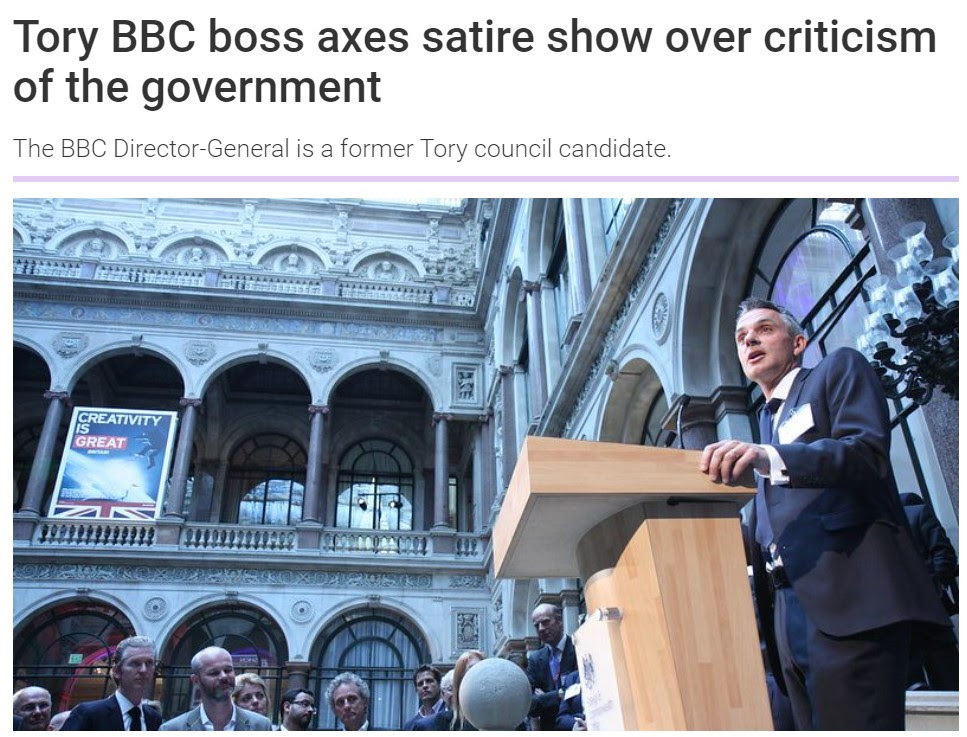
The same year, Richard Sharp was appointed as the new chairman of the BBC. Since 2021, the former Goldman Sachs banker has donated more than £400,000 to the Conservative Party, Electoral Commission records show. Sharp reportedly oversaw the work of Rishi Sunak, during the now PM’s early career in the finance industry.
Amid allegations that he helped Boris Johnson secure a £800,000 loan just weeks before he was recommend for the position by Johnson, Sharp now faces multiple investigations.
As he set out his blueprint for improving the broadcaster, the BBC’s chairman criticised Emily Maitlis for her comments about Dominic Cummings’ breaking of lockdown rules and criticism of the government on Newsnight. Sharp had told the Sunday Times that the BBC is “not a campaigning institution. Our approach is to present the facts and not to lead with a broadcaster’s opinion.” He also claimed that “the BBC does have a liberal bias” but insisted “the institution is fighting against it.”
In November, John McAndrew, former ‘anti-woke’ editorial director of news and programmes at GB News, was hired as the BBC’s director of news programmes. McAndrew, who was a launch director of GB News, worked closely with Andrew Neil, where he proposed an “anti-woke” alternative to established broadcasters.
Shackled by an increasing threat to the license fee and awash with right-wing Tory figures making threatening noises and seeking revenge for its Brexit coverage, journalistically and creatively, the BBC has become a shadow of its former self. Its news division employs 6,000 people, four times more than the UK’s largest newspaper group. But where are the impressive investigations, the bold scoops, and the breaking news stories we once saw?
Run by conservatives with partisan agendas rather than creative ones, the corporation has become feebler and more compliant than it used to be, to the detriment of its audience.
Decline of local newspapers and rise of right-wing news websites
The impact that declining local news has had on the rise of a British media’s swing to the right cannot be ignored. From 2005 to 2018, the UK suffered a loss of 245 local news titles. As weekly updates on what’s going on in local councils and courts falling on our doormats are no longer expected, there is now little or no accountability for councils, local politicians and more.
While a decline in print media in general has been compensated for by the rise in online news, this is not the case at a local level. The free and unregulated internet may have opened a door to liberal news sites, think HuffPost, Novara Media and of course Left Foot Forward, but it has presented endless opportunities for right-wing mouthpieces to foghorn their thoughts. Just have a quick peek at Piers Morgan’s Twitter feed, if you dare! Recognising the opportunity to reach limitless audiences and to make revenue gains amid print decline, right-wing news sites are springing up.
Kelvin MacKenzie, former editor of the Sun and Martin Clarke, former editor-in-chief and chief executive of Mail Online, are set to launch a new right-wing populist website called the Daily Disclosure. MacKenzie said he plans to hire and train up four or five young journalists who must be prepared to “work very hard for not much money.”

You can just imagine the content ‘Daily Disclosure’ will be filled with.
Probably more woke-bashing, hate-driven drivel the right-wing tabloid newspapers are stuffed with. Irrelevant nonsense that has little bearing on the lives of most ordinary people. Hysteria about taking charitable status from private schools, earnest articles about the phoney ‘Beergate’ scandal, the constant deriding of Harry and Meghan, and so on. Feeble distractions from issues that matter they may be, but they still manage to link them to attacks on left thinking.
Ironically, if you compare the stuff the right-wing media fill their pages with to what the polls say people are concerned about, there is an enormous gap.
Perhaps Kelvin MacKenzie has a point though when he says he is planning on training young journalists. As, at the moment, the UK media is full of over-the-hill right-wing commentators fulminating about the modern world to the older demographics who still consume their news in print format.
No wonder circulation is nosediving.
Right-wing media watch – Tory press ramp up campaign to resurrect Prince Andrew’s reputation
A photo of a man and a woman cramped together in a bath, fully dressed, donning masks of Prince Andrew and Virginia Giuffre, looks like an image you might see on a satirical site like News Thump, accompanying a wildly ridiculous piece about the Duke of York debacle.
But for the Conservative media, it is being used to advance the possibility that the Duke is not guilty of allegations that he was engaged in sexual activity with a teenage girl. The Telegraph even went as far as to watermark the image, in what seems like an effort to make out it has some sort of copyright or exclusivity over it. Accompanying the photo, which was taken by the family of Ghislaine Maxwell, is the headline: ‘Exclusive: The photo that ‘clears Prince Andrew’ over bath sex.’

Without boring you with too much detail, if you are not yet familiar with the story, the Maxwell family believes the photo discredits Giuffre’s claims that sexual activities began in the bath. Maxwell’s lawyers are also claiming that sexual ‘frolicking’ could not have happened because there was not enough room. The ‘game changing’ photo was released after it emerged that the Duke hopes to overturn the multi-million pound settlement he agreed with Giuffre a year ago, as the Telegraph keenly reports.
Publishing the story without any kind of interrogation over the credibility of a bizarrely staged photo, says more about the Telegraph’s seeming campaign to resurrect Prince Andrew’s reputation than it does about his possible innocence.
Just last week, columnist Charles Moore was chuntering on about the same thing. ‘I believe that Prince Andrew may well be innocent’ read the headline, with Moore claiming that the ‘burden of proof must never be reversed – even for royals.’ The author wastes no time pointing out that he was the only journalist to suggest at the time that Prince Andrew might not have been guilty of the allegations made against him by Giuffre.
Of course, the ‘innocent until proven guilty’ that Moore preaches about in Prince Andrew’s defence, is crucial to protecting the integrity of the justice system and respecting human dignity, we know that. But his and the Telegraph’s defence of the Duke begs the question – would the newspaper be so quick to defend someone wrapped up in paedophilic rape allegations and who paid a multimillion pound settlement to the accuser, if they weren’t a member of the Royal Family?
It’s no secret that Charles Moore – Baron Moore of Etchingham – is a monarchist. He once said that the monarchy “reaches parts politics cannot reach” and “it should stay that way.” He is also well connected to the Tory party, having been given peerage and made a member of the House of Lords under Boris Johnson’s government in 2020. Moore was editor of the Telegraph, Spectator and the Sunday Telegraph, and still writes for all three. He was even Johnson’s boss when the former PM was a journalist, and of course, biographer of Margaret Thatcher.
Being pushed onto the front page of the Telegraph, Moore’s defence of Prince Andrew is symptomatic of the symbiotic relationship between the royals and the Tory press.
It is also important to remember, that the whole Prince Andrew and Virginia Giuffre saga only became public because of the Epstein scandal breaking in the US. If it had been a UK scandal, the chances are that it would have all been hushed up by aggressive lawyers and/or discredited by Establishment toadies in the media.
In its account of the fake ‘sex bath’ image – distasteful language to use in a story relating to the alleged rape of a minor – the Telegraph does not linger on the absurdity of the photo, a term used by a US lawyer who represents nine of Jeffrey Epstein’s victims. US attorney Spencer Kuvin also claims the photo actually “undermines the case.” And it doesn’t take a legal expert to deduce that a staged photo taken by the family of someone convicted of conspiring with a late convicted paedophile to sexually abuse minors, splashed over newspaper front pages, is, yes, likely to undermine the case.
But that’s exactly what the Establishment press want, one could argue.
Woke-bashing of the week – Conservative press in a paddy over LSE’s ‘cancelling’ of Lent
Following the ‘woke brigade’s’ apparent ‘cancelling’ of Christmas the right-wingers love to hysterically pontificate, they are now in meltdown over the so-called rescinding of Lent and Easter.
According to Melanie McDonagh’s column in the Times, the London School of Economics (LSE) is erasing Lent, and, by doing so, is assaulting Christianity. How can a university erase Lent, you might ask? Oh, by abolishing Christian terminology, i.e Lent term and Easter break, in favour of ‘winter term’ and ‘spring break.’ As McDonagh notes, the LSE believes the new names use more “accessible and widely recognised terminology, and better reflect the international nature of our community and our broader global engagement.”
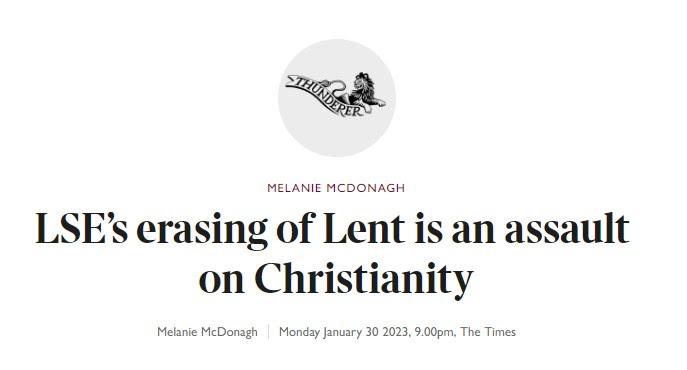
Forgive me if I’m wrong but naming academic terms to their relevant seasons is logical and is what most modern students will have become accustomed to throughout their whole academic careers, whether they were born and bred in Britain or are from overseas, and regardless of their religious or non-religious beliefs.
But according to the author, the LSE has nothing better to do than the “dechristianisation” of language. It seems like the Times, the Telegraph, the Mail and the other right-wing media outlets that keenly reported the story, have little better to write about. You’d think there was nothing else going on the UK right now!
While students at the LSE are probably blissfully unaware of the name of their academic terms, and couldn’t care less what they are called, the conservative commentators’ objections about the so-called dechristianisation of language has more to do with the war on woke than it does about Christianity. The Telegraph’s report of the story even mentions ‘woke’ in the first paragraph, claiming, in no uncertain terms, that ‘Lent has been cancelled by a ’woke’ university in a drive to remove Christian term names.’
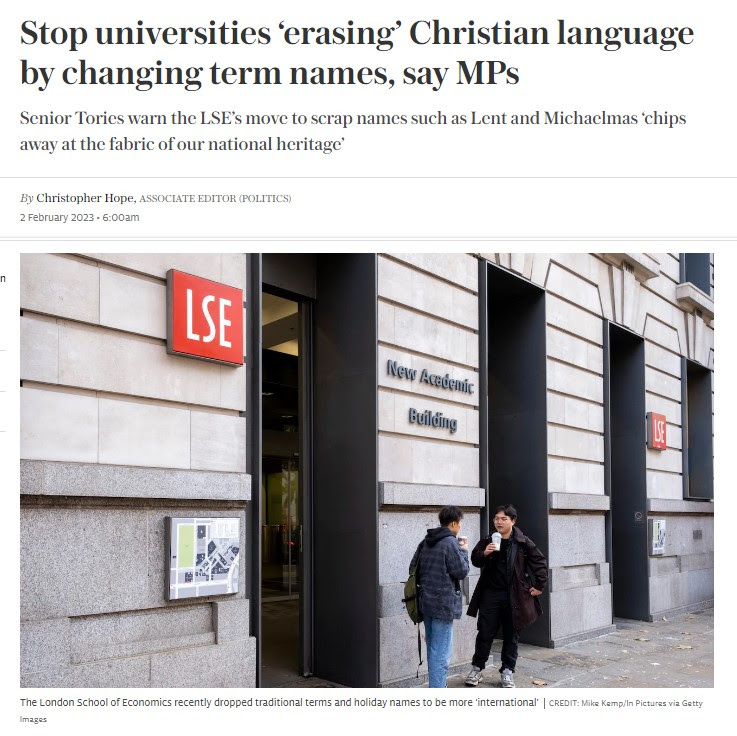
It didn’t take long for senior Tories to get excited about the LSE’s ‘assault’ on Christianity. A group of 20 Tory MPs have warned that universities which change the name of their terms “cause an irreversible erasure of the Christian language” and are “shockingly neglectful of the common culture.”
Common culture? Hmm… that’s debatable anyway given that Christianity is no longer a majority religion in England and Wales, as shown in the 2021 census.
And what’s more, with around half a million public sector workers walking out in the largest coordinated strike action for a decade this week, who on earth could be prattling on about a university changing its term names?
Oh, hang on, the warnings were made in a letter organised by the Common Sense Group of Tory MPs, which is, of course, headed by Sir John Hayes. That explains it then! These people spend their time bellyaching about ‘wokeism’, gripes which tediously always find their way to the pages of the right-wing press.
Thank goodness the New Statesman saw the LSE story for what it is, an objectionable overaction that is driven by misplaced nostalgia rather than Christianity.
We could have fun guessing what their next ‘woke’ objection will be. The Whit half-term recklessly referred to as the May holiday maybe?
Gabrielle Pickard-Whitehead is author of Right-Wing Watch
To reach hundreds of thousands of new readers we need to grow our donor base substantially.
That's why in 2024, we are seeking to generate 150 additional regular donors to support Left Foot Forward's work.
We still need another 117 people to donate to hit the target. You can help. Donate today.



